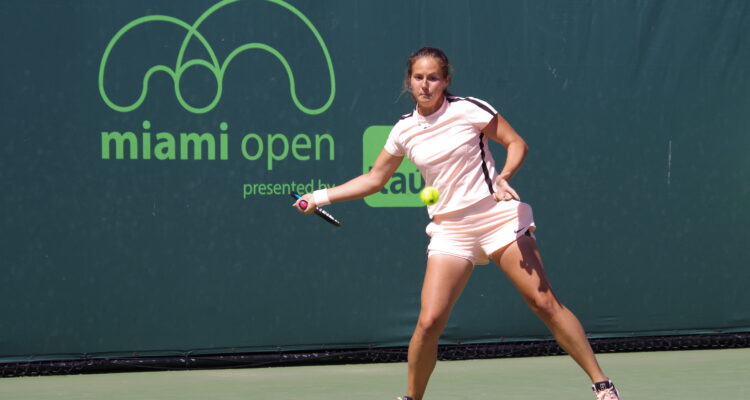WASHINGTON, December 14, 2018 (by Michael Dickens)
In an exhilarating 2018 season, Daria Kasatkina enjoyed a career week last March at the BNP Paribas Open in the desert climate of Indian Wells, California, that was a portent of good things to come. She beat Sloane Stephens, Caroline Wozniacki, Angelique Kerber and Venus Williams. No easy feat, but Kasatkina, then 20, held her own against each of these Top 10-caliber players. She dropped just one set.
Even though the native of Togliatty, Russia, would go on to lose 6-3, 6-2 to Naomi Osaka in the final, she showed she had arrived on the WTA scene – and both fans and media sat up and took notice. En route to finishing the year with a career-best No. 10 ranking after starting at No. 24, Kasatkina advanced to three WTA finals and won one title. She reached the quarterfinals or better in nine tournaments, including two Grand Slams – Roland Garros and Wimbledon – and finished 2018 with a 42-24 win-loss record, a nice improvement over her 32-12 record in 2017. Her earnings this year eclipsed $2.7 million.
Credit part of Kasatkina’s success to her ability to win points on her return as well as return games. According to WTA Insider Courtney Nguyen, Kasatkina won 48.3% of her return points while breaking her opponent’s serve 46.3% of the time.
“I feel more confident in the return, just from my nature,” Kasatkina said, as quoted by the WTA website. “I never work, like, hours and hours on the return. Of course I’m working on it, but not crazy, like I said, like hours per day. I just feel where to go, how to go. That’s it.”
In a recent profile of Kasatkina, which looked back on her upset of Williams at Indian Wells, Tennis.com’s Steve Tignor wrote: “Like her idol, Rafael Nadal, Kasatkina rolled high topspin forehands crosscourt, then stepped forward and cracked them inside out and inside in. With her backhand, she drove the ball to either corner with equal ease, which forced Williams to sprint side to side. Kasatkina buzzed one-handed slices an inch over the net, which forced Williams to bend. As if that wasn’t enough, she threw in her subtle, drop shot at surprising times, which forced Williams to bolt forward. There are few players – Andy Murray comes to mind – who use a two-handed backhand, yet who can also hit a one-handed slice as naturally as Kasatkina does.”
Kasatkina wins because of her talent, hustle and stubborn effort. Sometimes, she loses because of her stubbornness.
Often, Kasatkina’s on-court battles are as much mental as they are physical. Sometimes, as everyone learned during the final of the Kremlin Cup in Moscow – which was Kasatkina’s only 2018 title – her worst enemy is herself.
Against Ons Jabeur of Tunisia, one of her best friends on tour, Kasatkina lost the first set 6-2 and fell behind early in the second set before she rebounded to win, 2-6, 7-6 (3), 6-4. By the end of the two hour and two minute final, both players were in tears – one in joyful celebration, the other in painful agony. Kasatkina comforted Jabeur as she left the court clutching her painful left thigh.
During the trophy presentation, Kasatkina offered her fallen opponent praise, saying of Jabeur, “I saw you give everything today. This is what sport is all about. I really appreciate we had this match today and I wish you all the best. I’m really sure this is not our last final.”
In an episode of the WTA Insider Podcast following her Kremlin Cup triumph, Kasatkina said, “I love to play in Russia, I love Russian vibes. We say in Russia: At home, even walls are helping you.
“Everything just happened in this day. It was the birthday of my father, everybody was there, it was the last time they play Kremlin Cup in Olympiyskiy Stadium. This is also why I wanted to win this year because it will be Kremlin Cup but not this Kremlin Cup. Not the one every kid wants to win.
“So, for me, it’s like a fairytale. I still can’t believe it.”
Looking back, Kasatkina’s Belgian coach Philippe Dehaes told the WTA Insider Podcast, “To be honest, I cry a little bit when she came to my arm and start to cry a lot, so I was a little bit shocked.
“You know, you work a lot during the year. You sacrifice a lot of things,” he said. “Me, personally, I have family, I have kids and I don’t see them a lot. You work, we went through a very difficult summer.”
Following Wimbledon, Kasatkina lost in the second round at Moscow on clay, then struggled on the North American hard-court circuit. She lost in the second round at Montreal and bowed in the first round at Cincinnati. Seeded 11th at the U.S. Open, Kasatkina was eliminated in the second round. Finally, everything came together for her at the Kremlin Cup tournament, also in Moscow.
“So it’s a lot of hours of difficulties where you ask a lot of questions, and then you have this moment when you win the last point and she win the title,” said Dehaes. “It’s exactly what you expect. A little bit more during the year, but it does not happen often. So it was just great.
“And these few seconds of huge emotion refilled the battery for sure for another year, for sure.”






